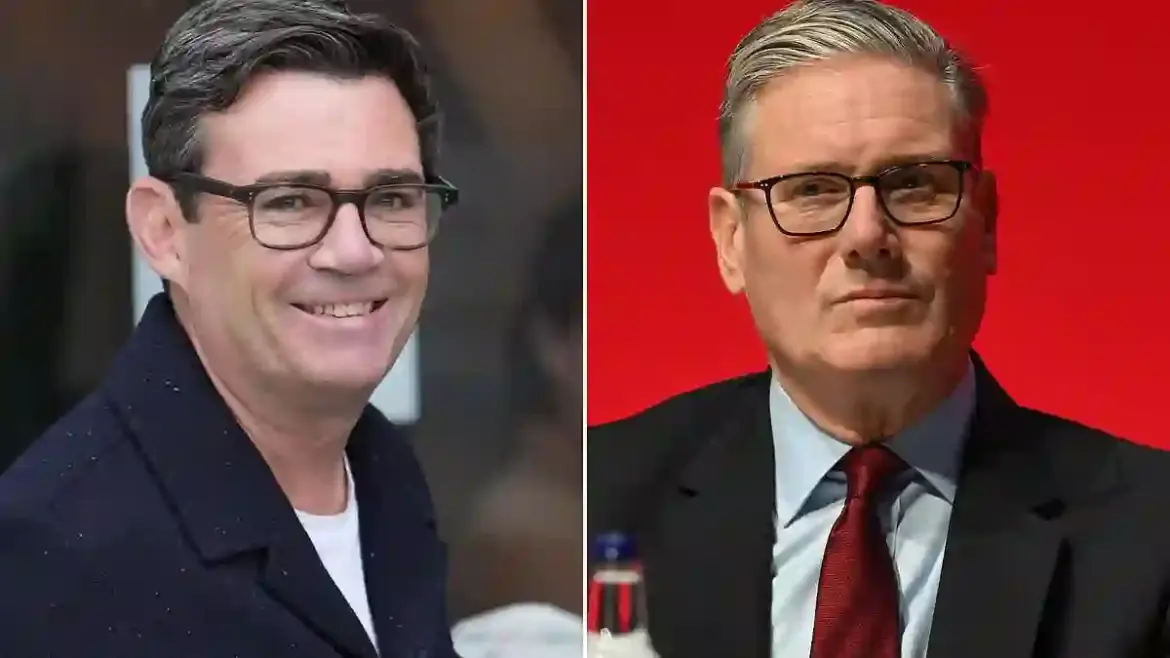As the Labour Party gathered in Liverpool this week, all eyes were on Greater Manchester Mayor Andy Burnham, who had been the subject of growing speculation over a possible leadership challenge.
Just days after hinting at potential discontent with Sir Keir Starmer’s leadership, Burnham appeared to step back, publicly endorsing the Labour leader as the right person to be Prime Minister.
Backing Sir Keir After Months of Speculation
Burnham’s shift came amid a whirlwind of reports suggesting that some MPs were quietly encouraging him to consider a leadership bid.
Only days ago, he had voiced criticism of Starmer’s leadership during a fringe event at the conference, leaving the door open for a potential challenge.
Yet, in a follow-up appearance, he gave a straightforward answer when asked if Starmer was the right man for the job: “Yes.”
He emphasized that his commitment to Greater Manchester remains his priority, stating that there was no real ability for him to launch a campaign from Westminster.
“You would have to wrench me out of the North West,” Burnham said, addressing claims that he was being “disloyal” or self-interested.
Defending His Economic Proposals
Burnham also defended his headline-grabbing proposals for tax and spending changes, which have drawn comparisons to the controversial policies of former Conservative Prime Minister Liz Truss.
His plans include allocating roughly £40 billion for council housing and reforms to land value taxation and council tax.
“I reject entirely this idea that I’m hopeless and have no idea how to make it add up,” he said.
“I’m doing it every day in Greater Manchester. No one ever says Greater Manchester is run in a financially imprudent way.”
Chancellor Rachel Reeves had previously warned that borrowing-heavy plans risked echoing Truss’s ill-fated mini-budget, which caused market turbulence.
Burnham maintained that his proposals had been misreported, insisting he aimed to spark broader debate within Labour ahead of the local elections next May.
Highlighting Behind-the-Scenes Contributions
Burnham also pointed to his quieter contributions, such as working on the Government’s Hillsborough legislation.
“It sticks in my throat somewhat for people who have just arrived on the scene to be throwing comments at me,” he said, adding that he had done everything possible to help make the conference a success.
He described his efforts as intended to provoke discussion about the party’s direction rather than to undermine Starmer.
Labour’s Struggles in the Polls
Meanwhile, polling and expert analysis suggest Labour faces an uphill battle.
Professor John Curtice, Britain’s leading elections analyst, gave a sobering assessment of the party’s current standing.
With Reform UK surging in the polls and Starmer’s personal ratings at record lows, Curtice suggested that resignations from key figures like Angela Rayner and Lord Mandelson had little impact because the problems were already so entrenched.
Even 15 months into government, voters reportedly remain unclear on Starmer’s key policies or vision.
“The honest answer is no,” Curtice said when asked whether Labour could quickly turn its fortunes around, adding that recovery might hinge on major economic improvements and reduced NHS waiting lists by 2029.
Burnham’s Popularity Among Labour Voters
Speculation about a leadership challenge has been fueled in part by Burnham’s popularity.
Curtice shared a chart indicating that Burnham was far more popular among 2024 Labour voters than Starmer, with a net favorability rating of plus 37 percent compared to the Prime Minister’s plus 13 percent.
Almost half of Labour voters in 2024 expressed a positive view of Burnham, highlighting his ongoing influence within the party.
